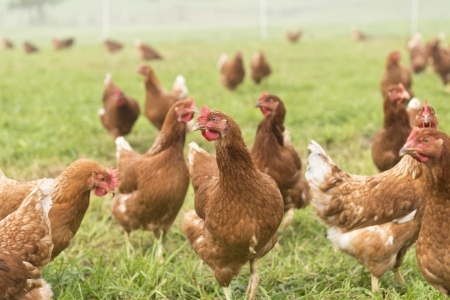
The British Free Range Egg Producers’ Association (BFREPA) have commissioned research into ways of reducing the number of seconds in the egg supply chain.
The association’s director of policy, Robert Gooch, announced at BFREPA’s annual meeting in Birmingham in November that it was looking at a proposal to examine ways of reducing the level of downgraded eggs, and he said he hoped that the work would be funded by a new sponsorship programme, through which companies in the egg industry were being invited to contribute towards a fund that could be used to commission research that would benefit the whole of the industry.
Robert said the new fund could be help BFREPA to “look at targeted projects to improve the performance and sustainability of free range long term.” He said, “One of the things the sponsors have been circulated is a study that we have asked ADAS to do a proposal on on reducing seconds throughout the chain. We would imagine that our sponsors, who are packers, for example, would work with us in tracing seconds back to producers and finding where the issues are in that whole supply chain - right through, perhaps to the lorries and so on. Obviously, the focus from our mem-bers point of view would be on the farm,” he said.
ADAS is now looking for producers to volunteer to take part in the work. It says that the research work would initially involve monitoring what happened on the farm but ADAS says it would then look to see whether seconds were also caused in transit or once they arrived at a packing centre.
Stephen Edge, of the Sustainable Food and Farming Group at ADAS, said, “We would be looking for any possible improvements on the farm. We would also want to see whether there was any potential damage done on the lorry.” And he said ADAS would look to engage packers to compare levels of seconds leaving the farm with the levels of seconds recorded by the packing centres. This would help to indicate whether some eggs were damaged in transit or at the packing centre.
BFREPA believes that seeking ways of reducing the number of seconds would be beneficial for everyone in the egg supply chain. It would inevitably improve financial returns for free range egg producers but would also ensure that the packer had more first grade shell egg to sell to its custom-ers. Stephen Edge agrees that there are benefits to be had by everyone.
“If we can reduce the number of seconds then there is the benefit of improved margins, but there is also the benefit of reduced waste,” he said. “Packers are looking to demonstrate what they are doing to reduce waste and improve their carbon footprint and sustainability. I hope packers will get involved in this because everyone has a part to play.”
Stephen said that in order to conduct the research ADAS would probably need about four producer volunteers who were all within an hour of Welshpool. He said the researchers would aim to go on farm when the layers were 35 weeks old and look at the systems being used, the equipment on the unit and how the unit was being managed. He said the researchers would do test gradings and suggest ways in which practices could be improved to reduce the level of seconds. They would return four weeks later to see whether the changes had made any difference to the results on the farm.
“We would want to go back pretty quickly because that keeps the pressure on the producer to do what needs to be done. And by going back after just four weeks we can more easily attribute any improvements to what has been done,” he said.
The proposed research into reducing seconds could be the first in a growing body of research work that BFREPA hopes to commission through the new sponsorship programme. Leading companies in the industry have already committed themselves to supporting the initiative financially. They include Noble Foods, Stonegate, L J Fairburn & Son, Big Dutchman, Potters Poultry, Hy-Line, Joice & Hill, Humphrey Feeds and Pullets, Country Fresh Pullets, Bumble Hole Foods and Oaklands Farm Eggs. BFREPA is actively seeking others in the industry to support the scheme and hopes that the list of sponsors will grow so that the funds provided by the programme can be used to benefit everyone involved.
Robert Gooch told BFREPA members at the annual meeting, “We have put together an industry sustainability programme, which we have invited industry to contribute to. I am delighted to say we have had a great response. Keith (Wild), with his contacts in the industry, has managed to get sup-port from a wide range of industry.”
He said, “It would be great if we could work with our sponsors and packers to make this a whole industry programme.” He said that, as well as the research into seconds, there were other potential subjects “in the chain coming up.” He said, “We think they will be of benefit to the whole industry, not just us as producers.”
Robert said that the sponsorship programme was a great step forward for BFREPA and for the industry as a whole. He said it was great to be working more closely with the industry. BFREPA, he said, saw the sponsorship programme as a very important development for the future.
